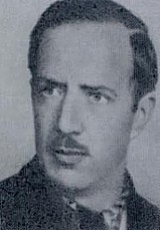
Action N
Encyclopedia

Sabotage
Sabotage is a deliberate action aimed at weakening another entity through subversion, obstruction, disruption, or destruction. In a workplace setting, sabotage is the conscious withdrawal of efficiency generally directed at causing some change in workplace conditions. One who engages in sabotage is...
, subversion
Subversion (politics)
Subversion refers to an attempt to transform the established social order, its structures of power, authority, and hierarchy; examples of such structures include the State. In this context, a "subversive" is sometimes called a "traitor" with respect to the government in-power. A subversive is...
and black-propaganda
Black propaganda
Black propaganda is false information and material that purports to be from a source on one side of a conflict, but is actually from the opposing side. It is typically used to vilify, embarrass or misrepresent the enemy...
activities carried out by the Polish resistance
Polish resistance movement in World War II
The Polish resistance movement in World War II, with the Home Army at its forefront, was the largest underground resistance in all of Nazi-occupied Europe, covering both German and Soviet zones of occupation. The Polish defence against the Nazi occupation was an important part of the European...
against Nazi German
Nazi Germany
Nazi Germany , also known as the Third Reich , but officially called German Reich from 1933 to 1943 and Greater German Reich from 26 June 1943 onward, is the name commonly used to refer to the state of Germany from 1933 to 1945, when it was a totalitarian dictatorship ruled by...
occupation forces during World War II
World War II
World War II, or the Second World War , was a global conflict lasting from 1939 to 1945, involving most of the world's nations—including all of the great powers—eventually forming two opposing military alliances: the Allies and the Axis...
, from April 1941 to April 1944. These activities were organized by Office N, which in October 1941 was transformed into an Autonomous Sub-Department N of the Bureau of Information and Propaganda
Bureau of Information and Propaganda
The Bureau of Information and Propaganda of the Headquarters of Związek Walki Zbrojnej, later of Armia Krajowa - in short: BIP) a conspiracy department created in spring 1940 during the German occupation of Poland, inside the Związek Walki Zbrojnej, then of the Supreme Command of Armia Krajowa...
of the Union for Armed Struggle, later of the Home Army. It was headed by Tadeusz Żenczykowski
Tadeusz Zenczykowski
Tadeusz Żenczykowski pseudonym Kania, Kowalik, Zawadzki , took part in the Warsaw Uprising of 1944, immediately after the war a member of anti-communist conspiracy in Poland, since 1945 an emigration journalist...
(codename Kania).
Operation N constituted part of a psychological-warfare campaign against the German occupation. It produced German-language
German language
German is a West Germanic language, related to and classified alongside English and Dutch. With an estimated 90 – 98 million native speakers, German is one of the world's major languages and is the most widely-spoken first language in the European Union....
newspapers and leaflets, ostensibly distributed by German anti-Nazi groups.
Structure
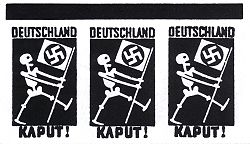
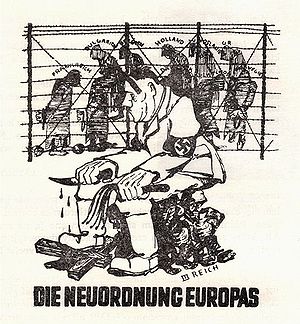
- organization,
- studies,
- subversive actions,
- editing,
- distribution of publications.
Work was carried on with extraordinary precision. The studies section collected special information about the history and geography of Germany, especially about the German language, its dialects, jargons used by various milieus and professional circles, terms used in state administration, about politics, the economy, and opinions current in the army, among the civilian population, etc.
On that basis, thousands of leaflets, pamphlets and periodicals of various political persuasions were produced, from communist to monarchist, as well as satirical and religious periodicals.
In order to act efficiently, there were necessary appropriate local agencies, a set of secret printing houses, printing machines, documentation, files. About 700-950 persons participated in the Action N (editors, translators, printers, couriers and distributors), including boy scouts of Szare Szeregi
Szare Szeregi
"Gray Ranks" was a codename for the underground Polish Scouting Association during World War II.The wartime organisation was created on 27 September 1939, actively resisted and fought German occupation in Warsaw until 18 January 1945, and contributed to the resistance operations of the Polish...
. About 20,000-30,000 copies of various publications were distributed per month (newspapers, periodicals, leaflets, etc.). In total, during 1942-1944 over 1 million copies of various publications and propaganda materials.
Aims
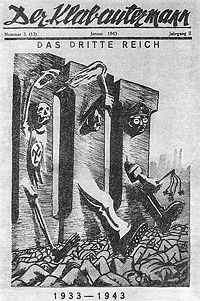
Volksdeutsche
Volksdeutsche - "German in terms of people/folk" -, defined ethnically, is a historical term from the 20th century. The words volk and volkische conveyed in Nazi thinking the meanings of "folk" and "race" while adding the sense of superior civilization and blood...
, officers of occupational administration. Among periodicals, the following titles were published regularly:
- Der Soldat (Engl.: Soldier), published by turns with a monthly Der Frontkämpfer (Engl.. The Front Combatant) - both the periodicals suggested the existence of a wide anti-Nazi opposition inside the German army; an alleged conspiracy organisation was to include circles of the body of generals and higher officers of the army.
- Der Hammer (Engl.: Hammer), and Der Durchbuch (Engl.The Breakthrough) - monthlies addressed for Germans of social-democratic and left-wing views.
- Der Klabautermann (Engl.: ship ghost, affecting seamen with misfortune) - a satirical periodical.
- Die Ostwache (Engl.: Guard in the East) - addressed for German occupational administration in the East.
- Die Zukunft (Engl.: The Future) - a periodical for Polish VolksdeutscheVolksdeutscheVolksdeutsche - "German in terms of people/folk" -, defined ethnically, is a historical term from the 20th century. The words volk and volkische conveyed in Nazi thinking the meanings of "folk" and "race" while adding the sense of superior civilization and blood...
, under a bilingual title. - Kennst Du die Wahrheit? (Engl.: Do You Know the Truth?) - a periodical addressed for Germans from the prewar area of the Third Reich and also for the VolksdeutscheVolksdeutscheVolksdeutsche - "German in terms of people/folk" -, defined ethnically, is a historical term from the 20th century. The words volk and volkische conveyed in Nazi thinking the meanings of "folk" and "race" while adding the sense of superior civilization and blood...
in occupied Poland.
Apart from that, two counterfeit issues of the Polish-language so-called reptile press the Goniec Krakowski daily (Kraków Courier) were published, and on 21 March 1943, 10,000 copies of a counterfeit issue of a similar daily Nowy Kurier Warszawski (English: New Warsaw Courier) were published.
Additionally, defetist pamphlets and leaflets were published. Their alleged authorship was to indicate some German anti-Nazi conspiracy organisations; they were to affirm the certainty of the close downfall of the Third Reich. All texts were elaborated by Polish translators in correct German language, with consideration of German regional dialects. Because of that, long after the war the actions were attributed to Germans.
Activities
Emphasis was placed on simulation of activities of non-existing German resistance groups and on impersonation of existing groups. For this purpose, a separate analytical cell was created in the Bureau of Information and PropagandaBureau of Information and Propaganda
The Bureau of Information and Propaganda of the Headquarters of Związek Walki Zbrojnej, later of Armia Krajowa - in short: BIP) a conspiracy department created in spring 1940 during the German occupation of Poland, inside the Związek Walki Zbrojnej, then of the Supreme Command of Armia Krajowa...
(Section II of Studies of the Sub-department of "N" Propaganda). Headed by Michał Mendys, it carried studies upon Nazism
Nazism
Nazism, the common short form name of National Socialism was the ideology and practice of the Nazi Party and of Nazi Germany...
; its social and political context, structural changes, personal staff, and current directions of activities. Studies were carried out on the ways the Nazi party communicated with the community, its party jargon, and its language notions. Studied were carried out on the prewar history, foundations, and political programs of German opposition organisations, and on conflicts and groups in Wehrmacht
Wehrmacht
The Wehrmacht – from , to defend and , the might/power) were the unified armed forces of Nazi Germany from 1935 to 1945. It consisted of the Heer , the Kriegsmarine and the Luftwaffe .-Origin and use of the term:...
. Based on the results of this analysis, twenty fictitious German organisations were created, including:
- Heimatsbund "Freiheit und Frieden" (Engl.: Homeland Association "Freedom and Friendship") - an underground civil organisation, with alleged seats in Muenchen and Berlin, appealing to the German civil population to stop their excessive work and sacrifices for Germany's military industry.
- Süddeutscher Freiheitsbund (Engl.: Freedom Association of Southern Germans) - an organisation allegedly active in Munchen and Wien. It called for new elections to the ReichstagReichstag (Weimar Republic)The Reichstag was the parliament of Weimar Republic .German constitution commentators consider only the Reichstag and now the Bundestag the German parliament. Another organ deals with legislation too: in 1867-1918 the Bundesrat, in 1919–1933 the Reichsrat and from 1949 on the Bundesrat...
, free of electoral falsifications, and called for the politics of NSDAP to be condemned by the whole nation. - Der Verband Deutscher Frontsoldaten (Engl.: Association of German Soldiers of the Front Line) - an anti-Nazi organisation favoring a speedy armistice with the AlliesAlliesIn everyday English usage, allies are people, groups, or nations that have joined together in an association for mutual benefit or to achieve some common purpose, whether or not explicit agreement has been worked out between them...
, and criticising the politics of NSDAP. - Soldatenbund "HindenburgPaul von HindenburgPaul Ludwig Hans Anton von Beneckendorff und von Hindenburg , known universally as Paul von Hindenburg was a Prussian-German field marshal, statesman, and politician, and served as the second President of Germany from 1925 to 1934....
" (Engl.: Soldiers' Association "Hindenburg") - an alleged military organisation attempting to persuade German soldiers of the impossibility of winning the war with the USSR, constantly stressing the high losses of Wehrmacht in the Eastern front, and calling for the overthrow of Adolf HitlerAdolf HitlerAdolf Hitler was an Austrian-born German politician and the leader of the National Socialist German Workers Party , commonly referred to as the Nazi Party). He was Chancellor of Germany from 1933 to 1945, and head of state from 1934 to 1945...
. - Verband der freien Deutschen Nordamerikas (Engl.: Association of Free Germans of North America in New York) - an organisation allegedly representing Germans living in the United States of America, denouncing the enormity of German crimes, opting against nazificationFascismFascism is a radical authoritarian nationalist political ideology. Fascists seek to rejuvenate their nation based on commitment to the national community as an organic entity, in which individuals are bound together in national identity by suprapersonal connections of ancestry, culture, and blood...
of EuropeEuropeEurope is, by convention, one of the world's seven continents. Comprising the westernmost peninsula of Eurasia, Europe is generally 'divided' from Asia to its east by the watershed divides of the Ural and Caucasus Mountains, the Ural River, the Caspian and Black Seas, and the waterways connecting...
, and calling on fellow citizens to fight against Adolf HitlerAdolf HitlerAdolf Hitler was an Austrian-born German politician and the leader of the National Socialist German Workers Party , commonly referred to as the Nazi Party). He was Chancellor of Germany from 1933 to 1945, and head of state from 1934 to 1945...
and NSDAP. - Der Deutsche Demokratenbund (Engl.: German Democratic Association) - an organisation that criticised the allies of the Third Reich i.e. Axis powersAxis PowersThe Axis powers , also known as the Axis alliance, Axis nations, Axis countries, or just the Axis, was an alignment of great powers during the mid-20th century that fought World War II against the Allies. It began in 1936 with treaties of friendship between Germany and Italy and between Germany and...
, in order to arise distrust of the allies and to weaken mutual relations. It attempted to persuade Germans that the alliance with Italy would result in a catastrophe for Germany. It also warned against the increase of the strength of Japan, and claimed that this was an outcome of the irresponsible politics of Adolf Hitler, who had promised Japan influence in AsiaAsiaAsia is the world's largest and most populous continent, located primarily in the eastern and northern hemispheres. It covers 8.7% of the Earth's total surface area and with approximately 3.879 billion people, it hosts 60% of the world's current human population...
and PolynesiaPolynesiaPolynesia is a subregion of Oceania, made up of over 1,000 islands scattered over the central and southern Pacific Ocean. The indigenous people who inhabit the islands of Polynesia are termed Polynesians and they share many similar traits including language, culture and beliefs...
without any guarantee that it would declare war on the USSR. - Der Soldatenrat einer Infanteriedivision im Osten (Engl.: Soldiers' Council of an Infantry Division in the East) - an organisation objecting against high losses in people and equipment in the eastern front. It addressed leaflets and open letters to German soldiers fighting in the eastern front, in which it protested against the mendacity of German propaganda and the absence of the freedom of speech, demanded a disclosure of the actual state of German losses, called for the replacement of the supreme commander of German army, and warned of the looming military defeat.
- Österreichische Freiheitsfront (Engl.: Austrian Front of Liberty) - allegedly created in Wien in 1943; it addressed leaflets to Austrians, in which it stressed that in the five years since the AnschlussAnschlussThe Anschluss , also known as the ', was the occupation and annexation of Austria into Nazi Germany in 1938....
Austria had been placed under the yoke of the Nazi authority and was suffering the burdens of war imposed by German fascists. In leaflets and proclamations, it stressed that Austrians were suffering hunger, persecution, and death not for their own cause, but in the interest of Germany. The organisation called for a fight against Nazis Third Reich and for the institution of local organisations under the banner "Austria for Austrians" (Germ. "Österreich den Österreichern").
Other activities
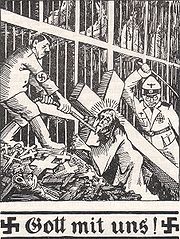
On 30 April 1942 a false order was sent out to 209 factories under German administration, ordering that all workers be granted a fully paid day off work, due to the celebration of the day the NSDAP came to power.
In February 1944 a false order was issued specifying the sequence of evacuation of all Germans residing within the area of the General Government
General Government
The General Government was an area of Second Republic of Poland under Nazi German rule during World War II; designated as a separate region of the Third Reich between 1939–1945...
, which was that the Gestapo
Gestapo
The Gestapo was the official secret police of Nazi Germany. Beginning on 20 April 1934, it was under the administration of the SS leader Heinrich Himmler in his position as Chief of German Police...
was to be evacuated first, then the SS, then the SA
Sturmabteilung
The Sturmabteilung functioned as a paramilitary organization of the National Socialist German Workers' Party . It played a key role in Adolf Hitler's rise to power in the 1920s and 1930s...
, then officials of the German administration, followed by the Reichdeutsche (i.e. Germans coming from the prewar territory of the Reich - Germany) and finally the Volksdeutsche
Volksdeutsche
Volksdeutsche - "German in terms of people/folk" -, defined ethnically, is a historical term from the 20th century. The words volk and volkische conveyed in Nazi thinking the meanings of "folk" and "race" while adding the sense of superior civilization and blood...
. It contained the forged signature of SS Commander and Police general Wilhelm Koppe
Wilhelm Koppe
Wilhelm Koppe was a German Nazi commander who was responsible for numerous atrocities against Poles and Jews in Reichsgau Wartheland and the General Government during the German occupation of Poland in World War II.-Biography:Born in Hildesheim, he fought in the First World War...
.
Similar actions of disinformation and other forms of propaganda were periodically carried out. After September 1943 the word "October" was written on walls, to evoke fears of the coming month of October.
Under a separate Action "tse-tse" Germans were annoyed by phone calls with threats, by letters, false notices or by sealing up the keyholes of their flats with gypsum. The "tse-tse" actions were carried by scouts of Szare Szeregi
Szare Szeregi
"Gray Ranks" was a codename for the underground Polish Scouting Association during World War II.The wartime organisation was created on 27 September 1939, actively resisted and fought German occupation in Warsaw until 18 January 1945, and contributed to the resistance operations of the Polish...
(ca 19 units) and every German was to receive two "stings" chosen from the various anti-German actions available. This was augmented by other forms of Small sabotage such as the painting of "Kotwica
Kotwica
The Kotwica was a World War II emblem of the Polish Secret State and Armia Krajowa . It was created in 1942 by members of the AK Wawer "Small Sabotage" unit as an easily usable emblem for the Polish struggle to regain independence. The initial meaning of the initials "PW" was "Pomścimy Wawer"...
", the "Sign of Fighting Poland", and was also carried out by Szare Szeregi
Szare Szeregi
"Gray Ranks" was a codename for the underground Polish Scouting Association during World War II.The wartime organisation was created on 27 September 1939, actively resisted and fought German occupation in Warsaw until 18 January 1945, and contributed to the resistance operations of the Polish...
.
Epilogue
Operation N peaked in 1943, when the network covered most of Poland, including SzczecinSzczecin
Szczecin , is the capital city of the West Pomeranian Voivodeship in Poland. It is the country's seventh-largest city and the largest seaport in Poland on the Baltic Sea. As of June 2009 the population was 406,427....
, Wrocław and towns of eastern Poland. In the spring of 1944 the operation was suspended. Several factors contributed to this:
- the uncovering, by the GestapoGestapoThe Gestapo was the official secret police of Nazi Germany. Beginning on 20 April 1934, it was under the administration of the SS leader Heinrich Himmler in his position as Chief of German Police...
, of Operation N's main Warsaw printing-house and of the whole operation in the period, December 1943 – March 1944 (though no order was issued for the operation's winding-down, and the network remained in readiness); - a substantial shift in the attitude of German community towards the policy of the Third Reich due to constant military discomfitures in the front and systematic bombardments by the AlliesAlliesIn everyday English usage, allies are people, groups, or nations that have joined together in an association for mutual benefit or to achieve some common purpose, whether or not explicit agreement has been worked out between them...
; - a change in political situation inside Poland: the German propaganda dropped down, while that of Polish communists of the Polish Workers' PartyPolish Workers' PartyThe Polish Workers' Party was a communist party in Poland from 1942 to 1948. It was founded as a reconstitution of the Communist Party of Poland, and merged with the Polish Socialist Party in 1948 to form the Polish United Workers' Party.-History:...
and that of the USSR intensified, which resulted in the institution in November 1943 by the Bureau of Information and PropagandaBureau of Information and PropagandaThe Bureau of Information and Propaganda of the Headquarters of Związek Walki Zbrojnej, later of Armia Krajowa - in short: BIP) a conspiracy department created in spring 1940 during the German occupation of Poland, inside the Związek Walki Zbrojnej, then of the Supreme Command of Armia Krajowa...
of Armia KrajowaArmia KrajowaThe Armia Krajowa , or Home Army, was the dominant Polish resistance movement in World War II German-occupied Poland. It was formed in February 1942 from the Związek Walki Zbrojnej . Over the next two years, it absorbed most other Polish underground forces...
of "Operation AntykOperation AntykOperation Antyk also known as Department R was a complex of counter-propaganda activities of Polish resistance movement organisation Home Army, directed against pro-Soviet and pro-communist circles in Polish society, mostly members of the Polish Workers' Party...
" to conduct anti-communist and anti-soviet propaganda.

